Hanukkah Meaning in the Bible Verse: Light and Dedication
Hanukkah, though not explicitly mentioned in the canonical Bible, is rich with theological and historical resonance. Rooted in the Maccabean Revolt‘s victory and the miraculous eight-day endurance of temple oil, it symbolizes divine intervention and spiritual resilience.
The menorah’s lighting embodies God’s eternal presence and the triumph of light over darkness, reflecting themes of hope and renewal. While not directly tied to specific verses, the festival indirectly reinforces the values of faith and dedication seen in broader biblical narratives.
Exploring Hanukkah‘s deeper meanings can enhance understanding of its enduring spiritual and historical significance.
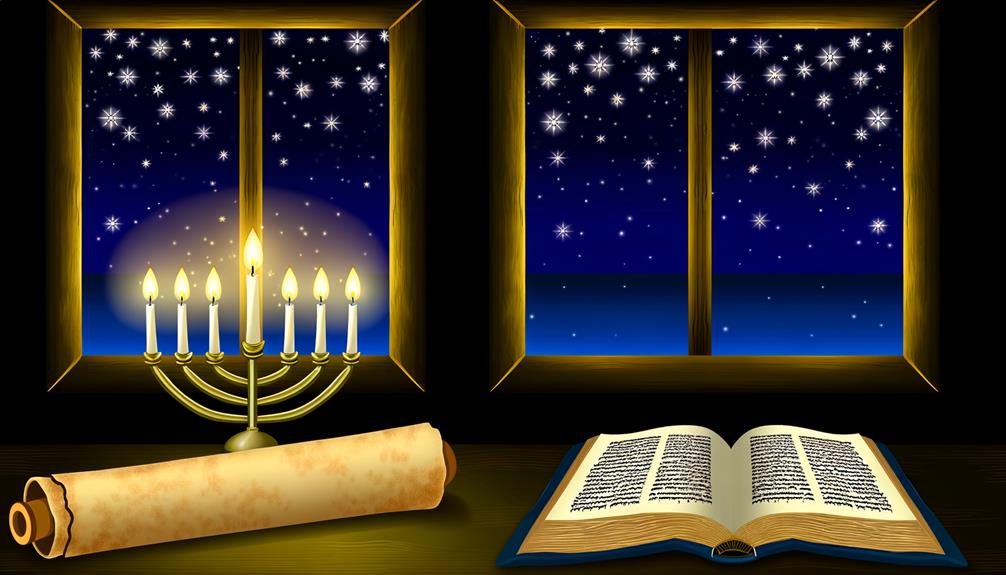
Hanukkah Meaning in the Bible: Origins and Significance
| Aspect | Details |
|---|---|
| Bible Reference | John 10:22-23 (Jesus at the Festival of Dedication) |
| Historical Origin | Commemorates the rededication of the Second Temple in Jerusalem. |
| Spiritual Significance | Celebrates faith, perseverance, and divine intervention. |
| Key Themes | Light, dedication, and God’s miracles in protecting His people. |
| Cultural Context | Linked to the Maccabean revolt and the miraculous oil that lasted eight days. |
| Modern Observance | Lighting the menorah, reciting blessings, and celebrating family and community. |
| Symbolism | Light represents hope, God’s presence, and the triumph of faith over adversity. |
Historical Background of Hanukkah
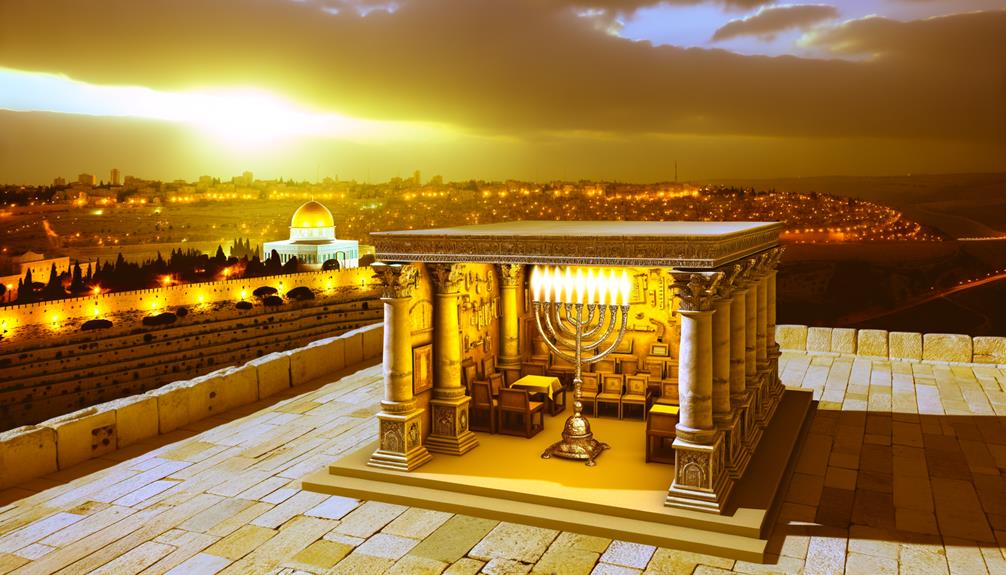
The historical background of Hanukkah is rooted in the Jewish struggle for religious freedom during the second century BCE, specifically the Maccabean Revolt against the Seleucid Empire.
This period witnessed the imposition of Hellenistic practices and the desecration of the Jewish Temple in Jerusalem, catalyzing a revolt led by the priestly Hasmonean family, known as the Maccabees.
Their victory culminated in the rededication of the Temple, an event marked by the miraculous burning of the menorah’s oil for eight days with a single day’s supply.
Theologically, this episode underscores the triumph of spiritual resilience and divine intervention over oppression.
Contextually, it highlights a pivotal moment in Jewish history, where identity and faith were fiercely defended and preserved.
Hanukkah in Jewish Tradition
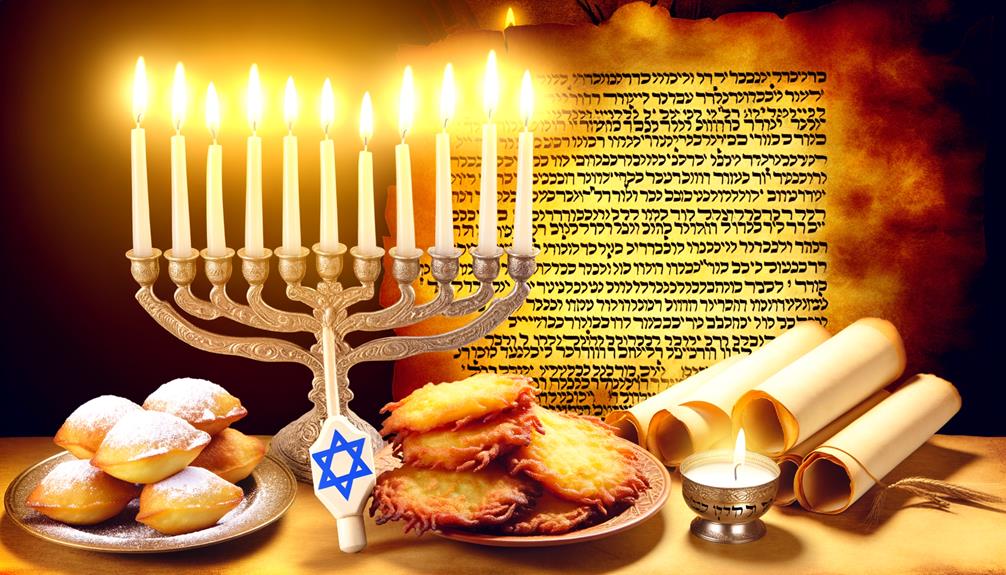
Building upon the historical significance of Hanukkah, Jewish tradition imbues the festival with rich rituals, symbolic practices, and theological reflections that reinforce communal identity and spiritual values.
The lighting of the menorah, a central ritual, symbolizes the miracle of the oil and divine providence. The festival also includes the recitation of special prayers and hymns that elevate its sanctity.
Key elements of Hanukkah tradition include:
- Lighting the Menorah: Each night, an additional candle is lit to commemorate the miracle.
- Reciting Hallel: Psalms of praise are sung to celebrate deliverance and divine intervention.
- Playing Dreidel: A game symbolizing Jewish resilience and learning.
- Eating Fried Foods: Latkes and sufganiyot represent the miracle of the oil.
Themes of Faith and Resilience
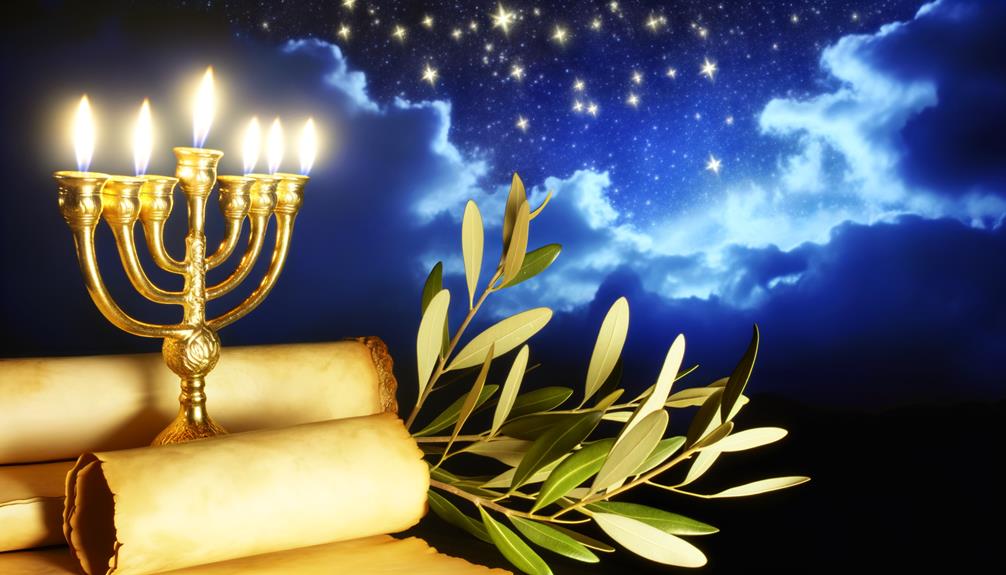
In exploring the themes of faith and resilience inherent in Hanukkah, one uncovers profound theological insights that underscore the festival’s enduring significance in Jewish spirituality and history.
The Maccabean revolt, central to Hanukkah, epitomizes the Jewish commitment to uphold their faith against overwhelming odds. This historical narrative serves as a proof of the resilience of the Jewish people, who, despite facing religious oppression, remained steadfast in their devotion to God.
The rekindling of the Temple menorah, even with limited oil, symbolizes the unwavering faith and hope that defied despair. Consequently, Hanukkah not only commemorates historical events but also reinforces the perennial values of faith, resilience, and the relentless pursuit of religious freedom.
Divine Intervention in Hanukkah
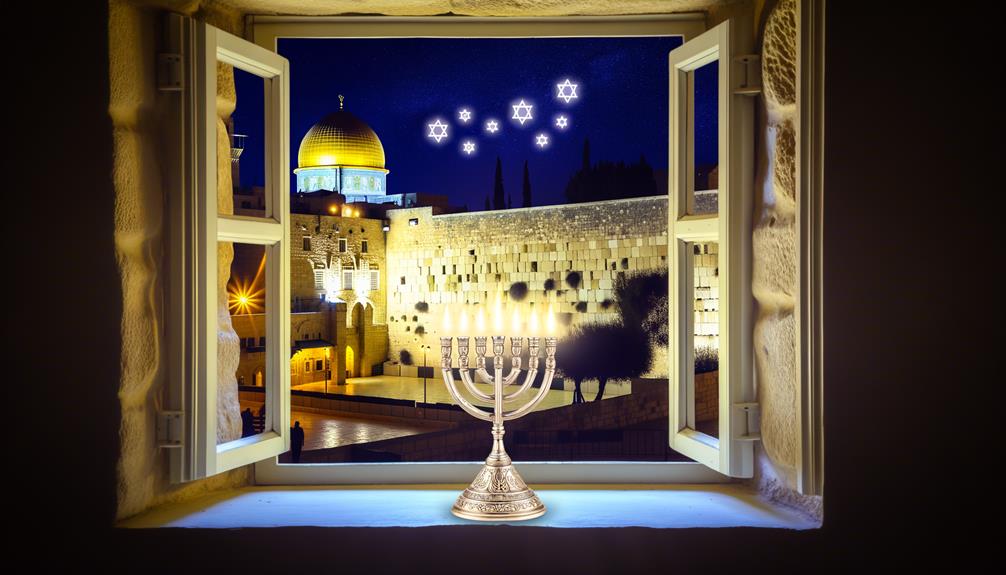
The concept of divine intervention in Hanukkah is exemplified through the miraculous provision of oil, which lasted eight days despite its meager quantity.
This event, coupled with the rededication of the Second Temple, underscores the themes of faith and perseverance in the face of adversity.
Theologically, these narratives highlight the enduring belief in a providential God who supports and sustains His people through miraculous means.
Miraculous Oil Provision
A central element of Hanukkah’s theological significance is the miraculous provision of oil, which symbolizes divine intervention and the enduring presence of God’s favor. This miracle narrative, rooted in Jewish tradition, highlights the sacredness of the menorah within the Temple. The single cruse of oil, meant to last one day, miraculously burned for eight days, underscoring the divine support.
Key theological insights include:
- Divine Providence: The miracle reflects God’s involvement in human history.
- Spiritual Resilience: The lasting oil symbolizes hope and perseverance.
- Sanctity of Light: The menorah’s light represents divine wisdom and guidance.
- Covenantal Faithfulness: God’s intervention reiterates His commitment to His people.
Temple Rededication Story
Building on the theme of miraculous provision, the rededication of the Temple during Hanukkah exemplifies divine intervention manifesting in the historical and spiritual renewal of the Jewish people.
The Maccabean revolt culminated in the reclamation and purification of the Second Temple, seen as an act of divine favor. This rededication, occurring in 164 BCE, underscores a theological motif: the sanctity of divine presence in a consecrated space.
The narrative of Hanukkah, rooted in 1 Maccabees and 2 Maccabees, reveals profound layers of symbolic restoration—both physical and spiritual.
The rekindling of the Temple’s menorah with a limited supply of oil, which lasted eight days, reinforces the belief in God’s enduring covenant and providential care over Israel.
Faith and Perseverance
Emphasizing the themes of faith and perseverance, the Hanukkah story illustrates how divine intervention can inspire steadfastness amidst adversity. This narrative is a profound illustration of the enduring spirit of the Jewish people, who, despite overwhelming odds, demonstrated unwavering belief in divine support.
Theologically, Hanukkah underscores the concept of God’s active presence in moments of crisis, fostering resilience and hope.
Key aspects to reflect on include:
- Miraculous oil: The single day’s oil supply lasting eight days signifies divine provision.
- Maccabean revolt: A small group’s victory against a vast army showcases faith-driven perseverance.
- Temple rededication: Renewed worship practices highlight spiritual reclamation.
- Cultural identity: Preservation of Jewish traditions amidst Hellenistic pressure.
Biblical Symbolism and Hanukkah
The symbolism of Hanukkah in the Bible extends beyond historical events to embody profound theological themes, particularly through the Menorah’s spiritual significance and the Festival of Dedication.
The Menorah, with its enduring light, serves as a potent symbol of God’s eternal presence and guidance amidst adversity.
Concurrently, the Festival of Dedication commemorates the rededication of the Second Temple, reflecting the enduring covenant between God and His people and emphasizing themes of renewal and divine fidelity.
Menorah’s Spiritual Significance
In examining the menorah’s spiritual significance, one must consider its profound biblical symbolism as a source of divine light and guidance during Hanukkah. The menorah, with its seven or nine branches, embodies various theological themes that resonate deeply within the Jewish faith.
- Divine Light: Symbolizes God’s eternal presence.
- Guidance: Represents God’s guidance for Israel.
- Creation: Reflects the seven days of creation.
- Wisdom: A conduit for divine wisdom and enlightenment.
- Covenant: Signifies the enduring covenant between God and Israel.
Each of these elements underscores the menorah’s role in illuminating the spiritual and moral path for the Jewish people, particularly during the reflective period of Hanukkah.
Festival of Dedication
Building upon the menorah’s spiritual significance, the Festival of Dedication, known as Hanukkah, embodies rich biblical symbolism that reflects themes of divine intervention, covenantal faithfulness, and the rededication of sacred space.
Rooted in the Maccabean revolt against Hellenistic oppression, Hanukkah celebrates the miraculous endurance of a single day’s worth of consecrated oil lasting eight days. This event underscores God’s providence and the enduring covenant with Israel.
The rededication of the Second Temple signifies not only physical restoration but also spiritual renewal. By observing Hanukkah, adherents reaffirm their commitment to maintaining the sanctity of their faith and heritage, drawing parallels to scriptural instances where God intervenes to preserve His covenantal promises.
Spiritual Lessons From Hanukkah
Hanukkah offers profound spiritual lessons that underscore themes of resilience, faith, and divine intervention within the context of Jewish history and biblical teachings. This festival commemorates the miraculous events surrounding the rededication of the Second Temple, serving as a beacon of hope and divine fidelity.
Key spiritual lessons include:
- Resilience: The perseverance of the Maccabees exemplifies enduring struggles against overwhelming odds.
- Faith: Trusting in divine providence, even when situations appear dire.
- Miracles: The miraculous oil lasting eight days symbolizes divine intervention.
- Light: Lighting the menorah signifies the triumph of light over darkness.
These themes resonate deeply, offering timeless lessons for spiritual fortitude and devotion.
Conclusion
The celebration of Hanukkah, rooted in historical events, holds significant theological implications within Jewish tradition.
It encapsulates themes of faith, resilience, and divine intervention, offering rich biblical symbolism that transcends its historical context. These elements not only enrich the narrative but also invite readers to reflect on their own spiritual journeys. The notion of “keep the fire burning meaning” resonates deeply, suggesting a continuous commitment to one’s beliefs and values in the face of adversity. Ultimately, this timeless message encourages individuals to nurture their faith, regardless of the challenges that may arise.
Through the lens of Hanukkah, one observes a profound narrative of spiritual perseverance and divine providence.
The holiday’s enduring relevance is a reflection of its deep spiritual lessons, providing contemporary believers with a robust framework for understanding faith and divine engagement.






